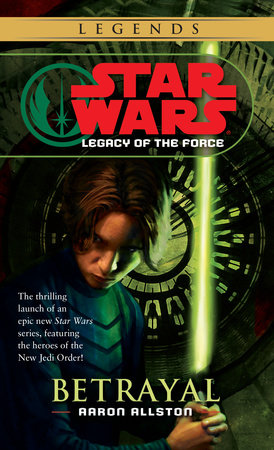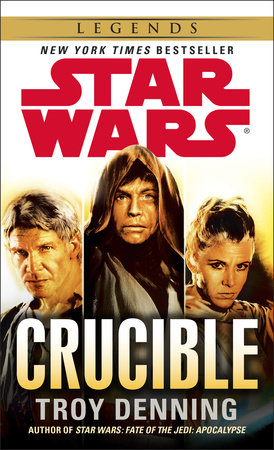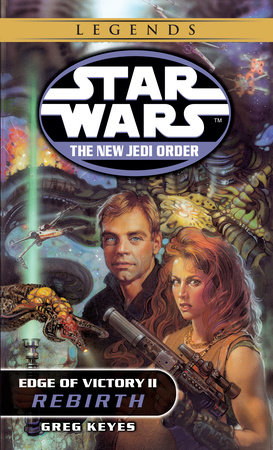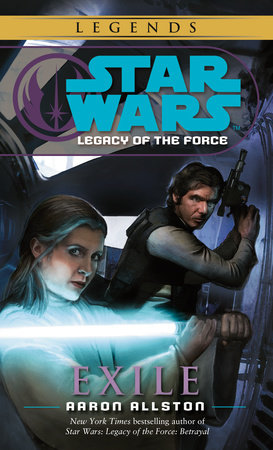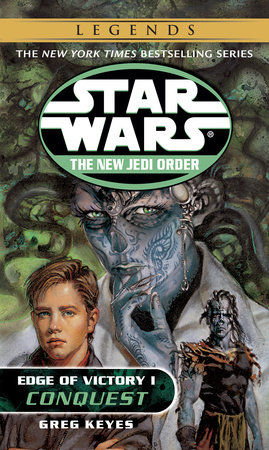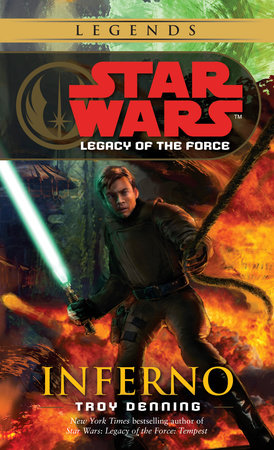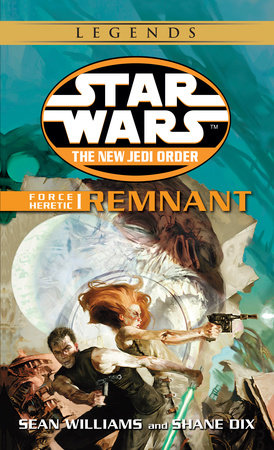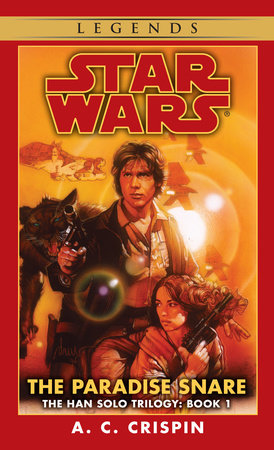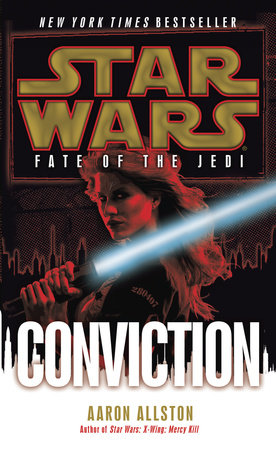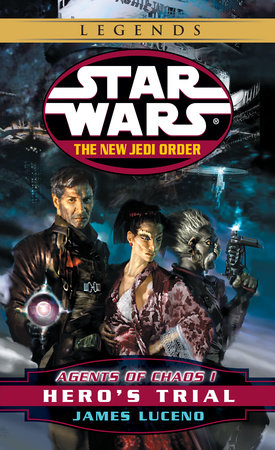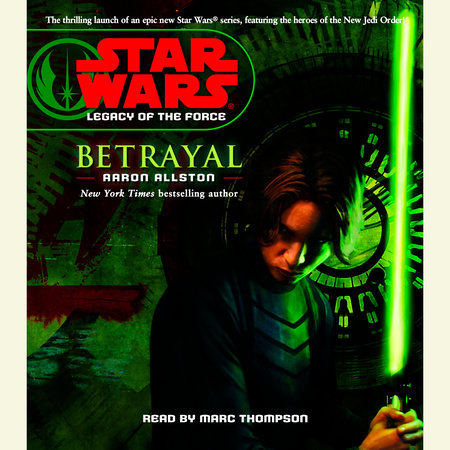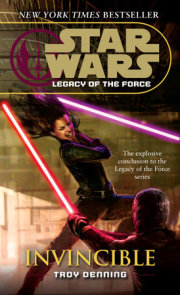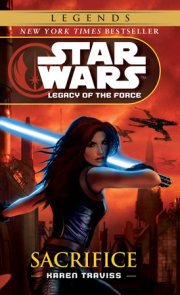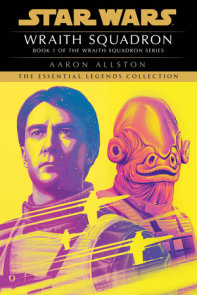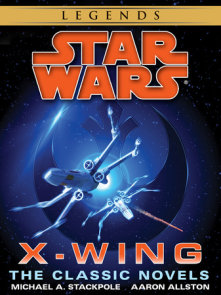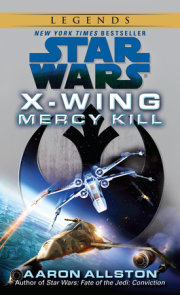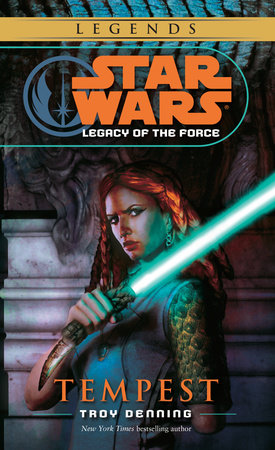Author Q&A
Interview with Aaron Allston , author of Star Wars Legacy of the Force: Betrayal
Question: Where does your new novel, Betrayal, fall in the Star Wars timeline?
Aaron Allston: It takes place several years after the NJO series. Ben Skywalker, born during the events of the NJO, is 13 at the start of the Legacy of the Force series. Chronologically, the last novel storyline before Legacy of the Force is Troy Denning’s Dark Nest trilogy, and Troy does some foreshadowing of Legacy events in his books.
Q: Can you set things up for us a bit?
AA: Sure. Years after the defeat of the Yuuzhan Vong, the galaxy is still recovering from the beating it sustained during those dark times. Now war may erupt again–this time between once-allied planets, as Corellia defiantly plays a game of brinksmanship with the Galactic Alliance.
The galaxy’s greatest heroes–Luke, Leia, Han, Jaina, Jacen, and many others–will find themselves reluctantly standing on opposite sides of the conflict … and a danger from Luke’s past will force Jacen Solo to make a difficult choice if he’s to save the lives of those he loves.
Q: Is this the beginning of a major new story arc, something along the lines of the New Jedi Order, in which many different writers will contribute, or is it a smaller arc to be written entirely by you?
AA: It’s sort of halfway between the two extremes. It’s a major story arc, as consequential to the Star Wars universe as the NJO was, but it’s a nine-book series being written by three writers: me, Karen Traviss, and Troy Denning. We’re in constant rotation, so I’m doing the first one, Karen the second, Troy the third, me again for the fourth, and so on.
One of the reasons the Legacy of the Force series has been interesting is because we learned so much nuts-and-bolts stuff with the New Jedi Order–about coordination of writers, handing off characters and subplots, that sort of thing. It’s fun to be able to put into practice what we learned.
Q: Jacen Solo is very much at the heart of this novel. Without giving any spoilers, can you talk a bit about how you see his character, and how he has been shaped, as a man and a Jedi, by the events of his past?
AA: That “without giving any spoilers” restriction makes this one a little tricky to answer. In becoming a Jedi, Jacen has followed a path unlike anything any other Jedi has traveled. He’s been exposed to more varieties of Force-related teaching than perhaps any other Force user. This may be his greatest strength but also his greatest weakness. He can do things no one else can, but he has also become accustomed to thinking so much for himself that he’s very, very quick to dismiss and disregard traditions. It’s as though he has so many predecessors that he’s quick to ignore the lessons learned by many of them. This combination of virtues and vices makes him very interesting to write.
Q: How do you see the relationship between Jacen and Luke? There seems to be some rivalry and resentment there, at least on Jacen’s part.
AA:Jacen loves his uncle. But at this point I think he loves him more than he respects him. Yes, there’s some resentment there. I don’t think of it as rivalry–Jacen doesn’t want Luke’s job, doesn’t want Luke’s specific role in history. He just wishes that Luke would see and understand what Jacen does and make decisions with a greater appreciation of Jacen’s outlook.
Q: Ben Skywalker also plays an important role in the book, one that I assume will grow as the series evolves.
AA: Definitely. Ben is a teenager, with a teenager’s normal curiosity, desire to make his way in the world, hormonal tides, resentments, paranoia, extraordinary potential, angst and drama… and he’s heir to one of the strongest, well, legacies of the Force in the galaxy far, far away. This is sort of like giving a teenager his own dynamite shack. Just how responsibly is he going to use it?
Q: An essential part of the novel’s plot has to do with the ability of Jedi to use the Force to glimpse potential futures. What are the limitations of this power? It seems strange for Jedi, who are trained to be so attuned to the present moment, to seek foreknowledge of a more-or-less predetermined future.
AA: There are great limitations on it, if only because the future is not fixed until it’s the present. Assuming you can see “the future” reliably and with crystal clarity–and no one in the Star Wars universe is that good, so far as I know–there’s the fact that the future is always in motion. Everything you do can change it. So peering into all the observable futures might give a Jedi some indication of patterns, of trends, but basing any decision on one of those futures is a very risky choice. It’s Charlie Brown assuming, yet one more time, that Lucy is going to hold the football steady for him to kick. Only this time lives are at stake.
With that in mind, I suspect that the stereotyped Jedi advice to “be mindful of the present,” in addition to “pay attention, stop daydreaming,” also means, “don’t base your decisions on what you see of the present–if you do, you’ll mess up.”
Q: You get into some intriguing aspects of Sith philosophy in this novel that I don’t recall seeing addressed before. How did you go about expanding or deepening the Sith philosophy? What restrictions or guidance did you have? And do you think a Jedi could embrace aspects of Sith beliefs and Force techniques without becoming evil or going over to the dark side as Anakin Skywalker did?
AA: As a writer, I have to do a lot of thinking about the personal ethics of the so-called bad guys in my novels. I’m not fond of cackling madmen or antagonists who willingly embrace the notion of evil. They are, in a word, lame. So the variations I’ve made to Sith philosophy emerge from that–from what I see as a need many of the Sith would have to create a philosophy that makes their actions acceptable, even heroic… from a certain point of view.
So with the Sith, we see a “career path” that makes them capable of ever-greater crimes and atrocities as they progress. Typically, the human method of inuring one’s self to atrocities is to become numb to them, to dehumanize the victims of the atrocities, and so on. That’s normal, but it’s also old hat, so I wanted to sort of chart a different course for the Sith–to suggest that those who try to deal with the issue ethically do so by forcing themselves to suffer when they cause suffering, to love what they are destroying, as a means to keep their own excesses in check.
I also wanted to suggest some points in common between Jedi and Sith philosophy, to better express their comparisons and contrasts. For example, if the extreme version of Sith philosophy involves destructive rage, destructive surrender to passion, then the extreme version of Jedi philosophy would be aloofness, emotionlessness, a tendency to become vested in law above compassion, that sort of thing… all with the notion that this was one of the errors made by the Jedi Council during the era of the prequels. I wanted to suggest that any philosophy taken to extremes is destructive, even a philosophy that is theoretically heroic and altruistic, like the Jedi code.
I didn’t have much in the way of restrictions. In part, that’s probably because we floated a this concept at a November 2004 story conference with Lucasfilm at Big Rock Ranch, so everyone knew what was going to be explored and what everyone else’s concerns were about it.
As for the question of whether a Jedi could embrace some aspects of the Sith philosophy and remain good–well, I suspect that the answer is yes, as long as it’s “aspects” and not the whole package. I also wonder sometimes whether a nonhuman could be a full-bore Sith and not be evil–I don’t think that’s possible with a human, owing to the weaknesses in human nature, but perhaps it would be possible with an alien.
Q: Wasn’t Vader supposed to unite the two sides of the Force? It would seem that prophecy of the future, at least, didn’t come true.
AA: Unite them . . . or bring them into balance? Much of the philosophy of the Force is based on real-world eastern philosophy, which posits the opposed but complementary positions of yin and yang. Bringing balance would seem to involve keeping yin and yang roughly equivalent in influence, rather than blending them together into some sort of New Age protein shake.
Q: Your writing is exceptionally detailed in its descriptions of military hardware, weaponry, and so on. Is the accumulation of detail the secret to convincingly describing objects that don’t really exist?
AA: I suspect that you’re the first person ever to say that to me. My natural tendency as a writer has always been to under-describe surroundings, so much so that I have to do a separate editing pass on each manuscript to make sure that I’ve included an adequate amount of sensory detail.
But, yes, I try to put myself into the reader’s head and analyze each passage of a book, asking, “Does this offer enough detail that the reader can visualize what’s going on?” Add to that the tricky task of describing equipment that’s already familiar to fans of the Star Wars universe–for example, X-wings–but still must be visualized by those who aren’t. What’s the magical halfway point between those two positions? I’m constantly trying to find it.
Q: What keeps you excited about working in the Star Wars universe after so many books and so many years?
AA: Well, it’s such a vast universe that there’s always a new pocket to develop. And the series now spans so much time that we can look in on the familiar characters at each new stage of their lives and find something interesting.
I mean, just look at Luke. There’s Luke as a teenager just experiencing the Force for the first time. Luke as a twenty-something, at the top of his craft as a fighter pilot, founding Rogue Squadron and acting as an important Rebellion leader. Luke as a Jedi Master, the only one in existence, taking on the burden of re-creating the Jedi order. Luke apparently doomed, by a series of romantic interests who appear in one novel each, to be a perpetual bachelor. Luke finding the right woman. Luke as a married man. Luke as the Master of a reviving Jedi order that includes other Masters in conflict with him. Luke fighting to keep his family alive in the face of an alien invasion that might destroy civilization as he knows it. Luke as a father. And so on, and so on. Every one of those Lukes can be the protagonist of one or more novels exploring those circumstances, and he’s only one character.
In other words, there’s always neat new stuff for every writer to jump into.
Q: Are you working on any other projects, Star Wars—related or not?
AA: Oh, yes. My plate is pretty full these days. I have two more novels in this series to do, and other, non—Star Wars, novels on the burners as well. I scripted, produced, and directed an ultra-low-budget horror movie, Deadbacks, that is now in post-production. I used to write role-playing game supplements for my living, and have another couple of projects to do in that field. I’ve also done some preliminary work on a couple of nonfiction books, one about writing fiction and one about low-budget film-making.
My website, www.AaronAllston.com, has all the details on these projects and more.
